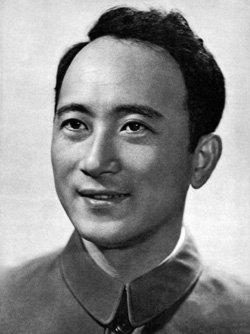
Sun Daolin was a Chinese actor and film director.

Xie is a Chinese-language surname. lt is usually romanized as "Hsieh" in Taiwan. It is estimated that there are more than ten million people with this surname, most of whom live in Taiwan, Southern China, South East Asia, America, Europe and Africa. It is particularly common in Taiwan where it is the 13th most common surname in 2016. It is also very common in the east Asian diaspora which historically tended to have disproportionately emigrated out of southern China. A 2013 study found that Xie was the 23rd most common surname in China, with 0.79% of the population having this surname. In 2019 it was again the 23rd most common surname in mainland China. Most Xie are from southern China. It is the 34th name on the Hundred Family Surnames poem.

Xie Fei is a Chinese film director, screenwriter, producer, film professor and film critic.

Woman Basketball Player No. 5 is a 1957 Chinese film presented by Tianma Film Studio and directed by Xie Jin, starring Qin Yi, Liu Qiong, Cao Qiwei and Wang Qi. It is the first colored sports movie filmed after the formation of the People's Republic of China. Yang Jie (杨洁), who was No. 5 in China women's national basketball team, was the prototype of the film.

Yan Shunkai was a Chinese comedian, actor and film director.
Song Zude, known as "the King of Media Hype", is a famous person in the entertainment circle of mainland China. From 2002 to 2008, his accusations and allegations toward different celebrities have been responded by national attention.
No.1 High School Affiliated to East China Normal University (华东师范大学第一附属中学) is a public secondary school in Shanghai, China.
Penitentiary Angel (also known as Behind the Wall of Shame, is a 1994 Chinese drama film starring Zhao Wei and directed by Jin Xie. The film was adapted from the same name novel. Official selection of 1995 UN's Women Conference.
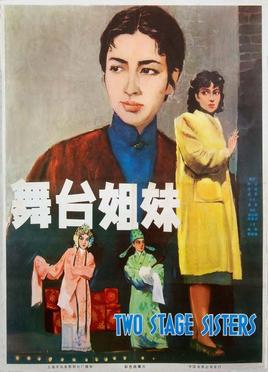
Two Stage Sisters is a 1964 Chinese drama film produced by Shanghai Tianma Film Studio and directed by Xie Jin, starring Xie Fang and Cao Yindi. Made just before the Cultural Revolution, it tells the story of two female Yue opera practitioners from the same troupe who end up taking very different paths in their lives: "one succumbs to bourgeois affluence and privilege, while the other finds inspiration and fulfilment in the social commitment associated with the May Fourth movement and the thought of Lu Xun.” The film documents their journey through abusive feudal conditions in the countryside before achieving success and prestige on the stage, meanwhile historically following Shanghai's experience under Japanese and KMT rule. This original screenplay depicts the socio-political changes encompassing China from 1935 to 1950 through the theatrical world of Shaoxing, and accordingly mixes both a Chinese aesthetic with Hollywood and socialist realist forms. The main protagonist is said to be based on the life of Xie Jin's friend and opera-veteran Yuan Xuefen.
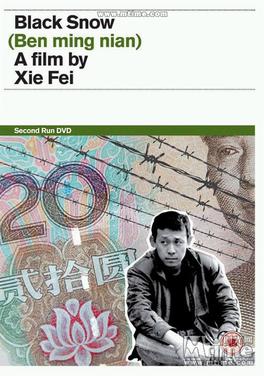
Black Snow is a 1990 Chinese drama film directed by Xie Fei. It was written and adapted from a novel by Liu Heng. It was entered into the 40th Berlin International Film Festival, where it won the Silver Bear for an outstanding single achievement. Although the English film title follows the original name of the novel, the Chinese film title 本命年 běnmìngnián means the year when someone is aged 12, 24, 36, and so on when the Twelve Terrestrial Branches come round again.
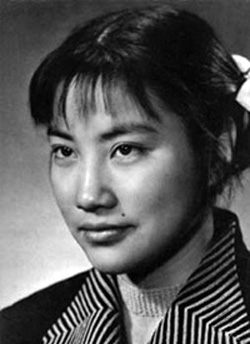
Zhu Xijuan is a Chinese film actress. In 1960, Zhang graduated from Shanghai Drama Academy. After the audition of The Red Detachment of Women, she selected as the leading role, which directed by Chinese master Xie Jin. For this breakthrough performance, Zhu won Hundred Flowers Award for Best Actress. In 1962, Zhu listed in the "Ministry of Culture in recognition of the twenty-two stars" (新中国22大明星).

The Patriot Yue Fei is a 2013 Chinese television series based on the life of Yue Fei, a Song dynasty general widely regarded as a patriot and culture hero in Chinese culture for his role in defending the Song empire against the Jurchen campaigns. While the plot is based on historical sources and descendants of the general served as consultants, it also includes elements of fiction and draws ideas from the novel General Yue Fei (說岳全傳) and other folktales on his life.
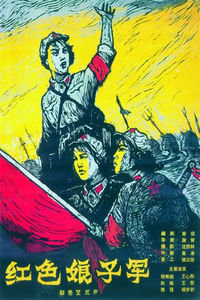
The Red Detachment of Women is a 1961 Chinese film by Xie Jin based on a script by Liang Xin. It is set in the 1930s and involves two peasant women who go into warfare. The cast includes Zhu Xijuan, Wang Xingang, Xiang Mei, Jin Naihua, Chen Qiang, and Niu Ben.

Xie Fang was a Chinese actress and author. She was best known for her involvement with pre-Cultural Revolution cinema.
The Last Aristocrats is a 1989 Chinese drama film directed by Xie Jin and starring Pan Hong, Pu Cunxin, Li Kequn, and Xiao Xiong. It is based on the short story Zhexianji by Taiwanese novelist Bai Xianyong. The film picks up the story of the lives of four young Chinese girls, daughters of Shanghai's elite, who went to the United States to study in 1948 and faced difficulties trying to return home a year later. The film was released in South Korea on 23 December 1989.
Qiu Jin, also known as Qiu Jin: A Revolutionary, is a 1983 Chinese biographical film co-written and directed by Xie Jin, starring Li Xiuming as the revolutionary Qiu Jin. The film also features Li Zhiyu, Chen Xiguang, Yu Shizhi, Wang Fuli, Huang Meiying, Cong Shan, Zhang Kezhong, Wu Wenlun, and Shi Weijian in supporting performances. The film based on the real life of Qiu Jin, focusing on her efforts in the 1900s to overthrow the corruption Qing Empire. The film was released in 1983 in China.
Xin Baiqing is a Chinese actor best known for portraying Li Bai in Legend of the Demon Cat (2017) and Guan Xiaohe in Four Generations under One Roof (2010), which garnered him a Best Performance Award at the 2012 Golden Lion Award.
Xie Jin (谢晋) was a Chinese film director.
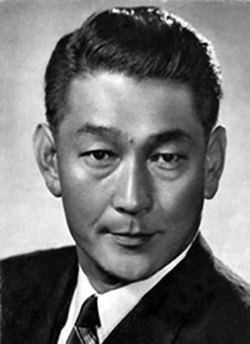
Xie Tian, born Xie Hongkun, was a Chinese actor and director. He is best known for portraying Mr. Lin in The Lin Family Shop and directing The Teahouse, based on the play of the same name by Lao She. In 1980, Xie won the Hundred Flowers Award for Best Director for his film, A Sweet Life.
Bai Chen, born Tian Zuheng, was a Chinese film director, screenwriter, and actor.













